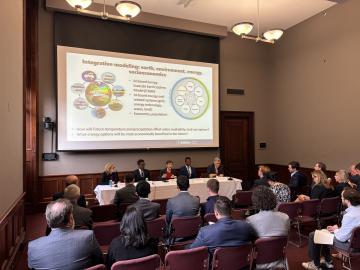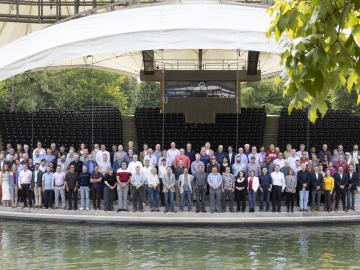
Filter News
Area of Research
- Advanced Manufacturing (7)
- Biology and Environment (52)
- Building Technologies (2)
- Computational Biology (1)
- Computational Engineering (1)
- Computer Science (10)
- Electricity and Smart Grid (1)
- Energy Science (129)
- Energy Sciences (2)
- Functional Materials for Energy (2)
- Fusion and Fission (29)
- Fusion Energy (15)
- Isotopes (1)
- Materials (94)
- Materials for Computing (10)
- National Security (22)
- Neutron Science (27)
- Nuclear Science and Technology (10)
- Quantum information Science (2)
- Supercomputing (92)
News Topics
- (-) Artificial Intelligence (131)
- (-) Big Data (79)
- (-) Energy Storage (114)
- (-) Frontier (64)
- (-) Fusion (66)
- (-) Physics (69)
- (-) Polymers (35)
- 3-D Printing/Advanced Manufacturing (146)
- Advanced Reactors (40)
- Bioenergy (112)
- Biology (128)
- Biomedical (73)
- Biotechnology (39)
- Buildings (74)
- Chemical Sciences (86)
- Clean Water (33)
- Composites (35)
- Computer Science (226)
- Coronavirus (48)
- Critical Materials (29)
- Cybersecurity (35)
- Education (5)
- Element Discovery (1)
- Emergency (4)
- Environment (218)
- Exascale Computing (67)
- Fossil Energy (8)
- Grid (74)
- High-Performance Computing (130)
- Hydropower (12)
- Irradiation (3)
- Isotopes (62)
- ITER (9)
- Machine Learning (68)
- Materials (157)
- Materials Science (158)
- Mathematics (12)
- Mercury (12)
- Microelectronics (4)
- Microscopy (56)
- Molten Salt (10)
- Nanotechnology (64)
- National Security (86)
- Neutron Science (171)
- Nuclear Energy (122)
- Partnerships (68)
- Quantum Computing (53)
- Quantum Science (93)
- Security (31)
- Simulation (65)
- Software (1)
- Space Exploration (26)
- Statistics (4)
- Summit (71)
- Transportation (103)
Media Contacts

A multi-institutional team of researchers led by the King Abdullah University of Science and Technology, or KAUST, Saudi Arabia, has been nominated for the Association for Computing Machinery’s 2024 Gordon Bell Prize for Climate Modelling.

The Department of Energy’s Office of Electricity, in partnership with ORNL, has launched an experimental platform for energy sector-related data with enhanced emphasis on governance and usability.

Researchers used the Summit supercomputer at ORNL to answer one of fission’s big questions: What exactly happens during the nucleus’s “neck rupture” as it splits in two? Scission neutrons have been theorized to be among those particles emitted during neck rupture, although their exact characteristics have been debated due to a lack of conclusive experimental evidence of their existence.

Researchers led by the University of Melbourne, Australia, have been nominated for the Association for Computing Machinery’s 2024 Gordon Bell Prize in supercomputing for conducting a quantum molecular dynamics simulation 1,000 times greater in size and speed than any previous simulation of its kind.

The Department of Energy announced a $67 million investment in several AI projects from institutions in both government and academia as part of its AI for Science initiative. Six ORNL-led (or co-led) projects received funding.

The Advanced Plant Phenotyping Laboratory at ORNL utilizes robotics, multi-modal imaging, and AI to enhance understanding of plant genetics and interactions with microbes. It aims to connect genes to traits for advancements in bioenergy, agriculture, and climate resilience. Senior scientist Larry York highlights the lab's capabilities and the insights from a new digital underground imaging system to improve biomass feedstocks for bioenergy and carbon storage.

To bridge the gap between experimental facilities and supercomputers, experts from SLAC National Accelerator Laboratory are teaming up with other DOE national laboratories to build a new data streaming pipeline. The pipeline will allow researchers to send their data to the nation’s leading computing centers for analysis in real time even as their experiments are taking place.

Prasanna Balprakash, director of AI programs for ORNL, discussed advancing climate and weather research through high performance computing and artificial intelligence as part of a September 18 panel for the United States Senate.

The Smoky Mountain Computational Sciences and Engineering Conference, or SMC24, entered its third decade with the 21st annual gathering in East Tennessee.

A new Global Biomass Resource Assessment developed by ORNL scientists gathered data from 55 countries resulting in a first-of-its kind compilation of current and future sustainable biomass supply estimates around the world.


